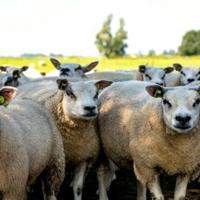Challenges with the bluetongue virus are plaguing Dutch farmer Erik van Norel. He thought he had overcome the virus, only to have it reemerge on his farm, causing severe problems for his livestock, including sheep that are dribbling, limping, and struggling to stand.
The bluetongue virus, a non-contagious disease transmitted by insects, affects sheep and cows but not pigs or horses. It is difficult to control once it infects animals.
Last year, the BTV-3 strain of the virus resulted in significant losses for Van Norel, with 80 animals falling ill and three-quarters of them dying within a short period.
Despite efforts to contain the virus and treat affected animals, the spread of bluetongue has been on the rise in the Netherlands and neighboring countries like France, Belgium, and Germany.
Vaccination has helped reduce the severity of the illness in Van Norel’s flock, but the financial burden and emotional toll on farmers like him are significant.
He is concerned about the long-term impact of bluetongue on his business, as the costs continue to mount and the threat of bankruptcy looms.
Efforts to mitigate the effects of the virus, such as vaccination campaigns, are ongoing, but farmers like Van Norel are calling for more support from government authorities and the European Union to address the challenges posed by bluetongue.





